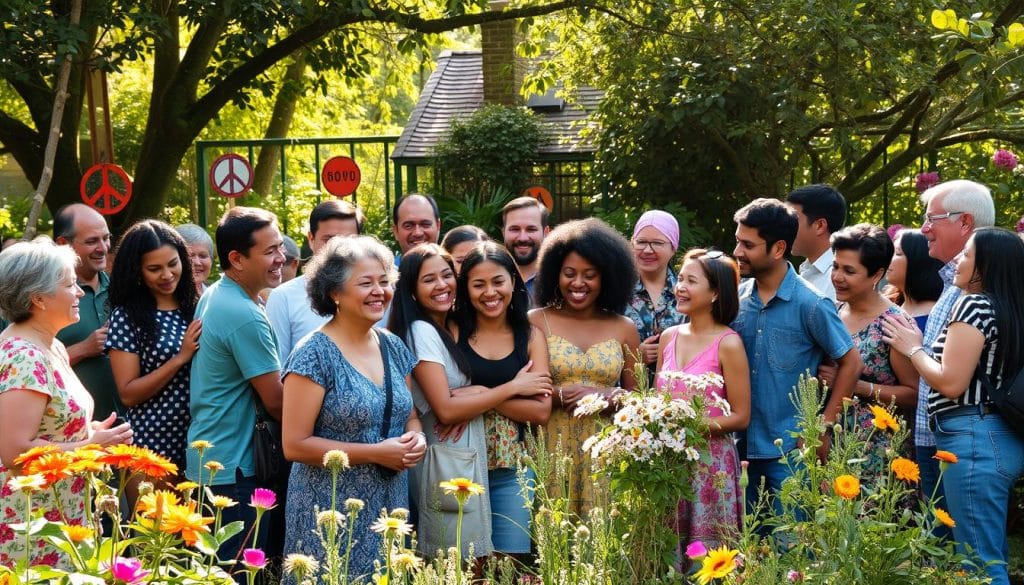Did you know the Progressive Christian Channel at Patheos has a lively community shaping the Church’s future1? This online space brings together voices from various Christian traditions. You’ll find ministers, professors, and artists, all exploring faith in today’s world1.
They discuss important topics like changing theology and spiritual practices. They also talk about faith and politics, social justice, and more. It’s a place where people from all walks of life come to share their perspectives.
Welcome to the Progressive Christian Resources: Faith Forward Journey. Here, we explore inclusive Christianity and the communities that are changing the face of spirituality. Get ready to be inspired, challenged, and empowered as we dive into the world of progressive Christianity.
Key Takeaways:
- The Progressive Christian Channel at Patheos hosts diverse voices shaping the future of the Church.
- Explore topics like transforming theology, spiritual practices, faith and politics, social justice, the Bible, and more.
- Discover inclusive Christianity and progressive faith communities redefining modern-day spirituality.
- Be inspired, challenged, and empowered on your faith forward journey.
- Uncover free resources like Bibles, maps, and legal advice for refugees and asylum seekers.
Understanding Progressive Christianity
Progressive Christianity is a movement that brings a fresh, open-minded view to faith. It questions old ways of thinking about Christianity, pushing for critical thinking and open discussion2. This movement talks about changing the church, updating theology, and how faith meets today’s world issues.
Defining Progressive Christianity
Progressive Christianity is all about being inclusive and socially aware. It moves away from strict rules and welcomes different views and practices2. It aims to make faith about justice, equality, and caring for the planet.
Key Principles of Progressive Faith
- Embracing diversity and celebrating the inherent worth of all people
- Promoting equality and speaking out against discrimination
- Adapting religious traditions to address modern challenges and concerns
- Emphasizing the spiritual journey over rigid adherence to doctrine
- Integrating scientific and intellectual advancements with Christian teachings
- Fostering a sense of community and collective responsibility
Progressive Christians look to Jesus for guidance, focusing on his teachings of love, acceptance, and change2. They aim to build a fairer world, using their faith to help others.
“My deepest me is God.” – St. Catherine of Genoa3
By living these principles, progressive Christians aim to refresh and redefine their faith2. This approach is becoming more popular, drawing those who want a faith that’s inclusive and cares about social issues.
Historical Background of Progressive Christianity

The roots of Progressive Christianity go back to the social gospel movement of the late 19th and early 20th centuries. Influential figures in the movement have included theologians, activists, and religious leaders who challenged traditional church doctrines and advocated for social reform.4 These individuals have played crucial roles in shaping progressive theology and promoting inclusive interpretations of biblical texts4.
Origins of Progressive Christianity
The emergence of progressive Christianity was shaped by figures like Karl Barth. His work had a big impact on U.S. American theology in the 1920s4. By the 1940s, the neo-orthodoxy movement, led by Barth and Niebuhr, faced criticism4. A big debate in the U.S. centered on Barth’s work and its impact on Christian theology4.
Influential Figures in the Movement
Prominent figures in the progressive Christian movement have included theologians and activists. They challenged traditional Bible interpretations and pushed for social justice. These individuals have played a crucial role in shaping progressive theology and promoting inclusive approaches to faith. For example, Christian feminist resources have been key in pushing for progressive biblical interpretation. They aim to challenge patriarchal structures and empower marginalized voices.
“The progressive Christian movement has been a powerful force in challenging the status quo and advocating for a more just and equitable society. Their work has been essential in broadening our understanding of the Christian faith and its role in addressing the pressing social and ethical issues of our time.” – Dr. Sarah Wilkinson, Professor of Theology
As the progressive Christian movement has grown, it has attracted new thinkers, activists, and faith leaders. They are committed to progressive biblical interpretation and Christian feminist resources. Their work has been key in shaping the ongoing dialogue around the church’s role in promoting social change and fostering a more inclusive and just world5.
Resources for Spiritual Growth
Progressive Christians have many resources to deepen their faith. There are books and podcasts that offer new views on traditional teachings. These materials consider modern knowledge and social progress6.
Suggested Books and Literature
Popular books for progressive Christians cover inclusive theology and social justice. “The Inclusive Bible” is a gender-neutral translation. “White Fragility” by Robin DiAngelo looks at race and racism from a Christian viewpoint1.
“Leaving Church” by Barbara Brown Taylor talks about her journey with the church. “The Cross and the Lynching Tree” by James H. Cone connects Jesus’ crucifixion with racial violence in America6.
Inspirational Podcasts
Progressive Christian podcasts offer spiritual nourishment. Shows like “The Liturgists Podcast,” “The Bible for Normal People,” and “The Deconstructionists” discuss theology and growth. They feature diverse views and guest speakers1.
The Liberty Worship Collective’s “Wait and See” EP is a new take on Advent hymns. It shows how progressive Christians are reimagining worship6.
Progressive Christians can find many resources to support their faith. Books, literature, and podcasts help deepen their understanding of the divine7.
Community and Support Networks

Progressive Christians can find community and support in many places. Both locally and online, progressive faith communities offer a space for inclusive Christianity. Here, people can connect, share, and explore their spiritual paths together.
Finding Progressive Christian Groups
Many progressive churches and groups offer chances for fellowship and growth8. They also have free job postings, helping people find jobs that match their values8. Some members even get free job postings as a perk8.
Online Community Resources
In today’s world, online platforms are also a great place for support9. For example, the Liberty Worship Collective released an EP called “Wait and See.” It has three songs based on Advent hymns9. These resources can inspire and connect those interested in progressive Christian views.
Websites like the Patheos Progressive Christian Channel are also important1. They are places for talks on faith, social issues, and spiritual practices1. These online spaces help progressive Christians share, ask, and connect with others, creating a sense of belonging.
By joining these local and online progressive faith communities, Christians can get the support they need. They can navigate their inclusive Christian journey with confidence and purpose.
Engaging with Social Justice
Social justice is key in progressive Christianity, leading many to get involved in advocacy and activism. Resources for progressive Christians help them link their faith with social action. They tackle issues like racial equality, LGBTQ+ rights, environmental protection, and economic justice.
Faith and Activism
Progressive Christian leaders and groups stress the need to mix faith with social and political action. They push followers to be a “prophetic witness” against injustice, aiming for a fairer society10. This is in line with the idea of “taking up the cross,” which means standing against oppression and not staying silent10.
Resources for Advocacy
Progressive Christian resources give many tools and advice for putting faith into practice. They include educational materials, guides for activism, and links to faith-based social justice groups11. Podcasts, books, and online courses help deepen understanding of Christian social activism, enabling believers to make a difference.
| Episode | Topic | Resources |
|---|---|---|
| 115 | Christian Nationalism | “Star Spangled Jesus: Leaving Christian Nationalism & Finding a True Faith” |
| 11, 12, 13, 62 | LGBTQ+ Issues in Christian Faith | “A Life of Unlearning – a preacher’s struggle with his homosexuality,” Beyond Blue, Lifeline, QLife Australia |
| 44, 48, 71 | Racial Equality and Social Justice | “Fall in Love, Have Children, Stay Put, Save the Planet, Be Happy” |
By getting involved in social justice through their faith, progressive Christians can help change society for the better. The resources they have are a great starting point for this journey12.
Inclusive Worship Practices
In progressive Christian faith communities, inclusive worship is key. These groups focus on diversity, equity, and inclusion in their services. They aim to make everyone feel welcomed and celebrated8.
Progressive Approaches to Worship
Progressive worship includes using gender-neutral language and embracing diverse traditions. It also makes sure the space is welcoming1. By using inclusive language and listening to marginalized voices, they work towards a fairer faith experience1.
Examples of Inclusive Liturgies
Inclusive liturgies might include prayers on social issues and using inclusive language for the Divine. They also use art, music, and rituals from different cultures1. These practices celebrate diversity and challenge old ways of thinking13.
Progressive faith communities strive to be welcoming to all. They aim to create a space where everyone can explore their spirituality1. Their focus on inclusivity is a core part of the progressive Christian movement13.
Educational Resources for Progressive Christians
Progressive Christians have many ways to learn more about their faith. They can take online courses, attend webinars, or go to conferences and retreats. These options help them connect with others who share their views on faith and social justice.
Online Courses and Webinars
The internet has made learning easier for everyone. There are many online courses and webinars on topics like inclusive theology and faith in social activism. These resources let people learn at their own pace and connect with others worldwide.
Conferences and Retreats
Meeting in person is also important for learning. Conferences and retreats offer a chance for deeper discussions and connections. They feature experts who talk about how faith is changing and its role in society. Going to these events can really change someone’s life, helping them grow and find their purpose.
| Educational Resource | Description |
|---|---|
| Online Courses and Webinars | Flexible, accessible learning opportunities that cover a wide range of progressive theological topics, including inclusive theology, faith and social justice, and the intersection of spirituality and modern perspectives. |
| Conferences and Retreats | In-person events that provide a space for deeper exploration, thoughtful dialogue, and meaningful connections with like-minded progressive Christians, often featuring renowned speakers and theologians. |
By using these resources, progressive Christians can grow in their faith and become stronger advocates for justice. Whether they’re taking online classes or attending events, they can become more informed and impactful. This helps them make Christianity more inclusive and caring for everyone.
Embracing Diverse Perspectives
Progressive Christianity values interfaith dialogue and learning from various religions14. It promotes open-mindedness and respect for different beliefs. Progressive Christians may join interfaith activities, study comparative religion, and seek common ground while staying true to their faith14.
Interfaith Dialogue
Progressive Christians can learn from others through interfaith discussions and events14. This exchange helps them understand different faiths better. It challenges their assumptions and deepens their appreciation for human diversity14.
Learning from Different Traditions
Progressive Christians often explore teachings from Buddhism, Hinduism, or Islam14. They find inspiration in these traditions’ practices and insights. This enriches their Christian journey and broadens their understanding of the sacred14.
| Tradition | Key Teachings | Potential Insights for Progressive Christians |
|---|---|---|
| Buddhism | Mindfulness, non-attachment, compassion | Cultivating present-moment awareness, releasing material desires, and practicing loving-kindness |
| Hinduism | Karma, dharma, reincarnation | Exploring the concepts of moral responsibility, purpose, and the cyclical nature of existence |
| Islam | Submission to God, community, social justice | Deepening their understanding of monotheism, the importance of community, and the call to serve the marginalized |
By embracing diverse perspectives, progressive Christians can have a more inclusive and enriching spiritual journey15. This openness leads to a deeper connection with the divine15. It also helps them develop a more nuanced biblical interpretation15 and create LGBTQ-affirming materials15.
Moving Forward in Faith
The journey of progressive Christianity is all about growing and changing. We aim to build a future for progressive faith communities that tackles tough issues. We want to make our faith meaningful in today’s fast-paced world3.
Building a Vision for the Future
Progressive Christianity is always evolving, inspired by leaders like St. Catherine of Genoa and Julian of Norwich. We must stay open to new ideas and learn from many sources. This includes listening to podcasts like “Re-Enchanting” and reading books like Simon Critchley’s “Mysticism.”3
We aim to build inclusive communities where faith leads to positive change. This might mean trying new worship styles, fighting for justice, and talking with people from other faiths. These actions help us understand God better3.
Encouragement for the Journey Ahead
The road ahead won’t be simple, but we’re part of a lively movement. We can find support and inspiration at events like “Theology Beer Camp” or online3.
Let’s hold onto Julian of Norwich’s words: “All shall be well, and all shall be well, and all manner of things shall be well.” With hope and determination, we can face the future. Together, we’ll make sure progressive faith communities and inclusive Christianity flourish3.
FAQ
What is the Progressive Christian Channel on Patheos?
What is Progressive Christianity?
What is the historical background of Progressive Christianity?
What resources are available for Progressive Christian spiritual growth?
How can Progressive Christians find support and community?
How do Progressive Christians engage with social justice?
What are some examples of inclusive worship practices in Progressive Christianity?
What educational resources are available for Progressive Christians?
How do Progressive Christians engage in interfaith dialogue?
What is the vision for the future of Progressive Christianity?
Source Links
- https://www.thegoodnewsblog.org/p/useful-textlinks.html
- https://thelondonlyceum.com/a-case-for-biblical-counseling/
- https://www.patheos.com/blogs/freelancechristianity/conversations-with-god/
- https://www.mdpi.com/2077-1444/15/12/1491
- https://theaquilareport.com/the-things-that-are-above/
- https://www.oneplace.com/ministries/-the-christian-outlook/
- https://providencefoundation.com/articles/christs-ever-increasing-kingdom/
- https://goodfaithmedia.org/
- https://www.liberty.edu/news/2024/12/06/liberty-students-encouraged-to-wait-and-see-what-god-has-planned-at-annual-advent-convocation/
- https://www.patheos.com/editorial/podcasts/the-social-jesus-podcast/2024/salvation-from-the-margins
- https://www.patheos.com/editorial/podcasts/i-was-a-teenage-fundamentalist/2024/115—star-spangled-jesus-with-april-ajoy
- https://www.progressivechurchmedia.com/shop/format/video/speak-for-peace-videos/?srsltid=AfmBOoqj1xMZ9HV5xM_nxZti5EUqz-W3cEHe-hQyz9JE-tvkmHS_aXIu
- https://www.firstparish.info/helping-uus-process-the-election/
- https://undpress.nd.edu/blog/2024/12/06/america-and-democracy-past-present-and-future/
- https://utoronto.scholaris.ca/server/api/core/bitstreams/be4d8669-43bb-4b9f-bea1-9e6d0923265f/content
